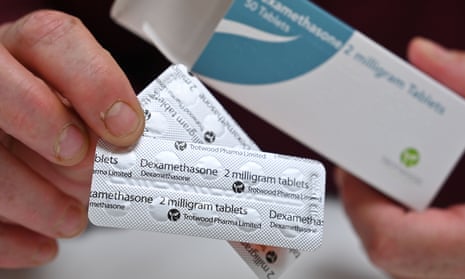Vaccines may have been described as the great escape route from the Covid pandemic – but treatments, which are bringing down death rates, will be needed as much as ever in the era of jabs because the virus is not expected to go away in the foreseeable future, experts say.
“It’s going to take a long time to vaccinate the world,” said Peter Horby of Oxford University, chief investigator of the Recovery trial into Covid treatments and chair of the New and Emerging Respiratory Virus Threats Advisory Group (Nervtag). “I don’t know what the estimates are, but we’ve already seen issues with manufacturing scale-up and difficulties in delivering at scale.
“On top of that you’ve got vaccine failures, there’s an interval between being vaccinated and being protected when you can get infected, a proportion of people don’t get a good response to vaccines or become sick and that may especially be true in the elderly who are particularly vulnerable. And now you’ve got the strain variation.”
Prof Martin Landray, co-chair of Recovery, said both vaccines and treatments are vitally important. Setting one above the other is a bit like saying “if you don’t want your house to catch fire or burn down, that because you’ve got all flame-retardant materials you don’t need the fire brigade”, he said. “We’re going to have to have treatments. And when you’re sick, whether you’ve had a vaccine or not, being told prevention is better than cure is not really terribly helpful.”
The efforts to find new treatments that will save lives are steadily gaining ground, they said. “There really is stuff coming out now. Obviously the steroids is the big one, but since then there’s been more and more positive news,” said Horby.
It was Recovery that showed the cheap and widely available steroid dexamethasone saved the lives of one in eight people who were severely ill, on ventilators, in hospitals. In July, Horby and others published a paper showing that 12,000 lives in the UK and 650,000 worldwide could be saved by January by the widespread use of dexamethasone. The drug is now standard treatment for those who are on ventilators.
“I think a paper … to be published soon estimates more than half a million lives saved,” he said.
There is other evidence that more people are recovering. A paper in the journal Anaesthesia shows that globally, death rates in intensive care have steadily fallen. At their highest, they were nearly 60% at the end of March. “Overall, mortality in all studies is lower to the end of September (35.5%) than when we reported this to the end of May (41.6%),” say the researchers, led by Prof Tim Cook from the Royal United hospital in Bath.
They credit the use of steroids, changes in the way Covid patients receive oxygen therapy and fluids and how the risk of blood clots is managed.
Colchicine is the latest drug to turn in exciting results, according to Horby. It is used to treat inflammation and pain in people with gout on the NHS – another example, Horby points out, of a drug that is cheap, safe, taken orally and readily available. A Canadian study of 4,000 outpatients was stopped too early to be certain of the effects, but it showed 20% reduced risk of hospitalisation or death. Recovery has so far recruited 6,000 hospital patients into its trial of the drug.
There are quite a few positive results from monoclonal antibody studies to prevent people becoming seriously ill, he said, although there are concerns about the effectiveness of the drugs against the variants of the virus. Recovery is trialling tocilizumab, which is a monoclonal antibody given to rheumatoid arthritis patients. A separate, international trial by Remap-cap has shown a benefit and Recovery will be reporting the results of its own study in a few weeks.
Landray said the monoclonal antibodies were vulnerable to changes in the virus. “If there’s a variation in that bit of the spike protein, these things just don’t stick at all. It’s like having the wrong screwdriver for the screws. It just doesn’t just doesn’t work. And so, going forward, in terms of drug development, we’re going to have to think quite carefully,” he said. It would probably mean drug developers would have to select different antibodies to keep up with mutations, tweaking the drugs as we may have to tweak the vaccines.
Drugs to prevent blood clots are looking promising. Clotting is a big issue in severe Covid as a result of inflammation, which was initially a surprise. “We’ve got aspirin in the trial, which I’m quite excited about because that’ll be another dexamethasone if it works – cheap and cheerful,” Horby said.
In January, a trial in the US reported that full dose heparin, a blood thinner, given to people who were moderately ill in hospital reduced the likelihood that they would need ventilation and life-support.
